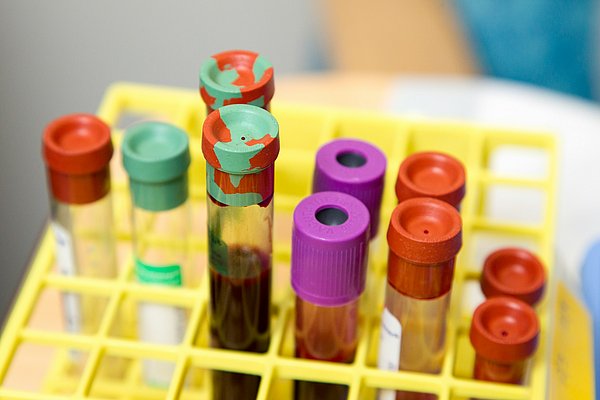The “Hopp Children's Cancer Center Heidelberg” (KiTZ) is a joint institution of the German Cancer Research Center (DKFZ), Heidelberg University Hospital (UKHD) and Heidelberg University (Uni HD).
Acute lymphoblastic leukemia (ALL) is the most common form of leukemia in children and adolescents and accounts for a good fifth of all childhood and adolescent cancers. Every year, around 550 to 600 children and adolescents in Germany are diagnosed with this form of blood cancer. Around 80 percent of these can be cured. The others suffer relapses with poor prognoses due to resistance.
Resistance to chemotherapy is particularly common in T-ALL, a subtype of ALL. As a recent study has now shown, the source of the problem is a small treatment-resistant cell population that is already present at the time of diagnosis and multiplies considerably in the event of a relapse. Researchers from the Molecular Medicine Partnership Unit, the Hopp Children's Cancer Center Heidelberg (KiTZ) and the German Cancer Research Center (DKFZ) analyzed individual T-ALL cells from a total of 18 patients at the time of diagnosis and after a relapse and compared their molecular make-up with leukemia cells from patients who did not suffer a relapse.
As the single cell analyses showed, many patients carry a small cell population with stem cell-like properties early on in the course of the disease. These stem cell-like cells show particular resistance to chemotherapeutic agents both in cell culture and in mice. The clinical relevance of this discovery was also demonstrated in the analysis of a large number of patient samples: the stem cell-like cells were increasingly found in patients in whom treatment with these chemotherapeutic agents did not work well from the outset.
Studies in other cancers also indicate that cells with stem cell-like properties are the reason why therapies no longer work. “So far, however, it has not been possible to identify individual stem cell-like T-ALL cells that are responsible for relapses and to precisely characterize their molecular properties,” emphasizes Jan Korbel, head of the “Molecular Pediatric Oncology” research group at MMPU, interim head of EMBL in Heidelberg and research group leader at DKFZ. He heads the MMPU research group and the study together with Andreas Kulozik, Professor of Pediatric Oncology, Hematology and Immunology at the Medical Faculty of Heidelberg University, founder of MMPU, Medical Director of the Clinic for Pediatric Oncology, Hematology and Immunology at UKHD, Director of the Clinical Program of KiTZ and Head of the Clinical Cooperation Unit Pediatric Leukemias at DKFZ.
The single cell analyses also showed that the stem cell-like cancer cells have different molecular characteristics that could also be relevant for therapy decisions: stem cell-like cells with certain gene activity patterns were an indicator of relapse. According to the authors, the stem cell score developed in the study could therefore serve as a clinical biomarker in the future to assess the risk of relapse and, if necessary, adapt the therapy.
“With the approach developed in the study of being able to examine stem cell-like leukemia cells individually and characterize them molecularly, we would also like to examine in future what influence different treatment regimes and therapeutic agents have on the development of these cells,” explains Andreas Kulozik.
The authors hope that stem cell-like cells are a promising therapeutic target for preventing relapses in children and adolescents with T-ALL and overcoming resistance.
Original publication:
Costea J. et al. Role of Stem-Like Cells in Chemotherapy Resistance and Relapse in Pediatric T-Cell Acute Lymphoblastic Leukemia. In: Nature Communications (Online-Publikation, 27. Juni 2025) DOI: 10.1038/s41467-025-61222-1
About the Molecular Medicine Partnership
MMPU is an inter-institutional partnership between the Medical Faculty of Heidelberg University and the European Molecular Biology Laboratory (EMBL).
It promotes innovations and their translational implementation in medicine - at the interface between basic research in molecular biology and clinical healthcare. The MMPU currently consists of nine international and interdisciplinary research groups, which are supported by physicians, doctoral scientists, doctoral students and technicians. The research focus of the MMPU group “Molecular Pediatric Oncology” is on childhood leukemia. Visit website




